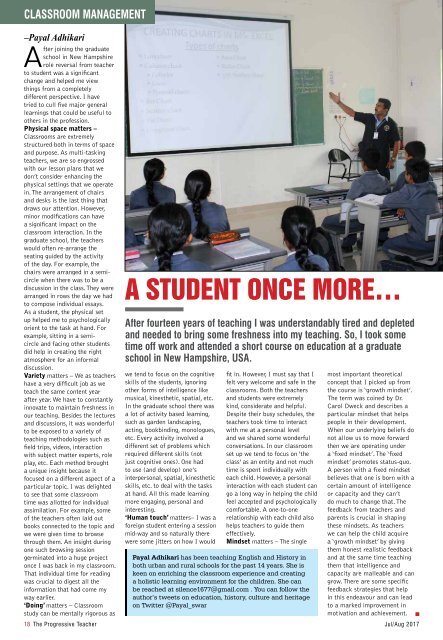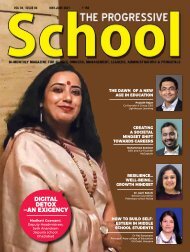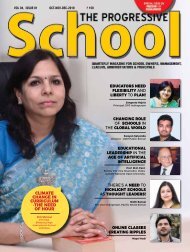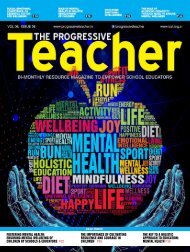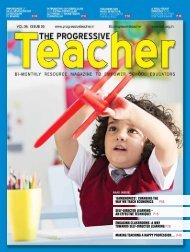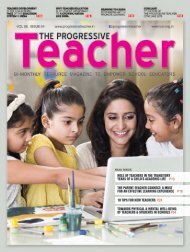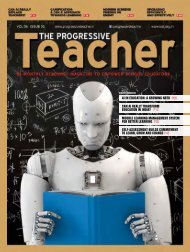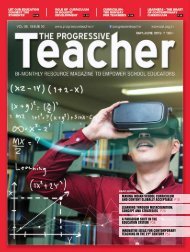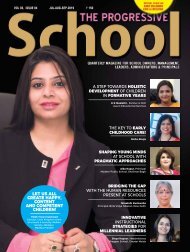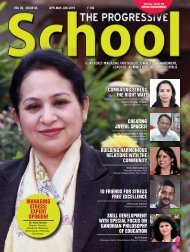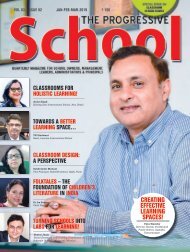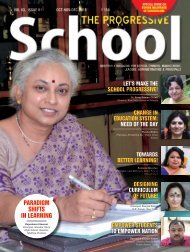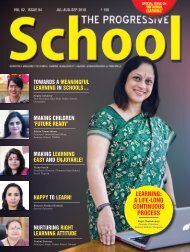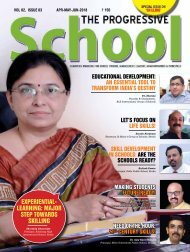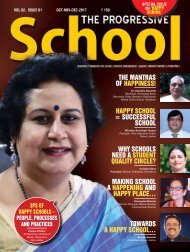The Progressive Teacher Vol 04 Issue 03
This issue of The Progressive Teacher focuses on "New Trends in Education ". In this edition, articles explore contemporary trends to enhance interactive learning amongst students.
This issue of The Progressive Teacher focuses on "New Trends in Education ". In this edition, articles explore contemporary trends to enhance interactive learning amongst students.
You also want an ePaper? Increase the reach of your titles
YUMPU automatically turns print PDFs into web optimized ePapers that Google loves.
classroom management<br />
–Payal Adhikari<br />
After joining the graduate<br />
school in New Hampshire<br />
role reversal from teacher<br />
to student was a significant<br />
change and helped me view<br />
things from a completely<br />
different perspective. I have<br />
tried to cull five major general<br />
learnings that could be useful to<br />
others in the profession.<br />
Physical space matters –<br />
Classrooms are extremely<br />
structured both in terms of space<br />
and purpose. As multi-tasking<br />
teachers, we are so engrossed<br />
with our lesson plans that we<br />
don’t consider enhancing the<br />
physical settings that we operate<br />
in. <strong>The</strong> arrangement of chairs<br />
and desks is the last thing that<br />
draws our attention. However,<br />
minor modifications can have<br />
a significant impact on the<br />
classroom interaction. In the<br />
graduate school, the teachers<br />
would often re-arrange the<br />
seating guided by the activity<br />
of the day. For example, the<br />
chairs were arranged in a semicircle<br />
when there was to be a<br />
discussion in the class. <strong>The</strong>y were<br />
arranged in rows the day we had<br />
to compose individual essays.<br />
As a student, the physical set<br />
up helped me to psychologically<br />
orient to the task at hand. For<br />
example, sitting in a semicircle<br />
and facing other students<br />
did help in creating the right<br />
atmosphere for an informal<br />
discussion.<br />
Variety matters – We as teachers<br />
have a very difficult job as we<br />
teach the same content year<br />
after year. We have to constantly<br />
innovate to maintain freshness in<br />
our teaching. Besides the lectures<br />
and discussions, it was wonderful<br />
to be exposed to a variety of<br />
teaching methodologies such as<br />
field trips, videos, interaction<br />
with subject matter experts, role<br />
play, etc. Each method brought<br />
a unique insight because it<br />
focused on a different aspect of a<br />
particular topic. I was delighted<br />
to see that some classroom<br />
time was allotted for individual<br />
assimilation. For example, some<br />
of the teachers often laid out<br />
books connected to the topic and<br />
we were given time to browse<br />
through them. An insight during<br />
one such browsing session<br />
germinated into a huge project<br />
once I was back in my classroom.<br />
That individual time for reading<br />
was crucial to digest all the<br />
information that had come my<br />
way earlier.<br />
‘Doing’ matters – Classroom<br />
study can be mentally rigorous as<br />
A student once more…<br />
After fourteen years of teaching I was understandably tired and depleted<br />
and needed to bring some freshness into my teaching. So, I took some<br />
time off work and attended a short course on education at a graduate<br />
school in New Hampshire, USA.<br />
we tend to focus on the cognitive<br />
skills of the students, ignoring<br />
other forms of intelligence like<br />
musical, kinesthetic, spatial, etc.<br />
In the graduate school there was<br />
a lot of activity based learning,<br />
such as garden landscaping,<br />
acting, bookbinding, monologues,<br />
etc. Every activity involved a<br />
different set of problems which<br />
required different skills (not<br />
just cognitive ones). One had<br />
to use (and develop) one’s<br />
interpersonal, spatial, kinesthetic<br />
skills, etc. to deal with the tasks<br />
at hand. All this made learning<br />
more engaging, personal and<br />
interesting.<br />
‘Human touch’ matters– I was a<br />
foreign student entering a session<br />
mid-way and so naturally there<br />
were some jitters on how I would<br />
fit in. However, I must say that I<br />
felt very welcome and safe in the<br />
classrooms. Both the teachers<br />
and students were extremely<br />
kind, considerate and helpful.<br />
Despite their busy schedules, the<br />
teachers took time to interact<br />
with me at a personal level<br />
and we shared some wonderful<br />
conversations. In our classroom<br />
set up we tend to focus on ‘the<br />
class’ as an entity and not much<br />
time is spent individually with<br />
each child. However, a personal<br />
interaction with each student can<br />
go a long way in helping the child<br />
feel accepted and psychologically<br />
comfortable. A one-to-one<br />
relationship with each child also<br />
helps teachers to guide them<br />
effectively.<br />
Mindset matters – <strong>The</strong> single<br />
Payal Adhikari has been teaching English and History in<br />
both urban and rural schools for the past 14 years. She is<br />
keen on enriching the classroom experience and creating<br />
a holistic learning environment for the children. She can<br />
be reached at silence1677@gmail.com . You can follow the<br />
author’s tweets on education, history, culture and heritage<br />
on Twitter @Payal_swar<br />
most important theoretical<br />
concept that I picked up from<br />
the course is ‘growth mindset’.<br />
<strong>The</strong> term was coined by Dr.<br />
Carol Dweck and describes a<br />
particular mindset that helps<br />
people in their development.<br />
When our underlying beliefs do<br />
not allow us to move forward<br />
then we are operating under<br />
a ‘fixed mindset’. <strong>The</strong> ‘fixed<br />
mindset’ promotes status-quo.<br />
A person with a fixed mindset<br />
believes that one is born with a<br />
certain amount of intelligence<br />
or capacity and they can’t<br />
do much to change that. <strong>The</strong><br />
feedback from teachers and<br />
parents is crucial in shaping<br />
these mindsets. As teachers<br />
we can help the child acquire<br />
a ‘growth mindset’ by giving<br />
them honest realistic feedback<br />
and at the same time teaching<br />
them that intelligence and<br />
capacity are malleable and can<br />
grow. <strong>The</strong>re are some specific<br />
feedback strategies that help<br />
in this endeavour and can lead<br />
to a marked improvement in<br />
motivation and achievement.<br />
18 <strong>The</strong> <strong>Progressive</strong> <strong>Teacher</strong> Jul/Aug 2017


